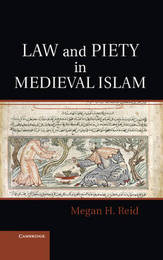
|
Law and Piety in Medieval Islam
Hardback
Main Details
| Title |
Law and Piety in Medieval Islam
|
| Authors and Contributors |
By (author) Megan H. Reid
|
| Series | Cambridge Studies in Islamic Civilization |
|---|
| Physical Properties |
| Format:Hardback | | Pages:266 | | Dimensions(mm): Height 236,Width 158 |
|
| Category/Genre | History of religion
Islam |
|---|
| ISBN/Barcode |
9780521889599
|
| Classifications | Dewey:297.570902 |
|---|
| Audience | | Professional & Vocational | |
|---|
|
Publishing Details |
| Publisher |
Cambridge University Press
|
| Imprint |
Cambridge University Press
|
| Publication Date |
22 July 2013 |
| Publication Country |
United Kingdom
|
Description
The Ayyubid and Mamluk periods were two of the most intellectually vibrant in Islamic history. Megan H. Reid's book, which traverses three centuries from 1170 to 1500, recovers the stories of medieval men and women who were renowned not only for their intellectual prowess but also for their devotional piety. Through these stories, the book examines trends in voluntary religious practice that have been largely overlooked in modern scholarship. This type of piety was distinguished by the pursuit of God's favor through additional rituals, which emphasized the body as an instrument of worship, and through the rejection of worldly pleasures, and even society itself. Using an array of sources including manuals of law, fatwa collections, chronicles, and obituaries, the book shows what it meant to be a good Muslim in the medieval period and how Islamic law helped to define holy behavior. In its concentration on personal piety, ritual, and ethics the book offers an intimate perspective on medieval Islamic society.
Author Biography
Megan H. Reid is Assistant Professor of Religion at the University of Southern California.
Reviews'A well-written, thoughtful book.' Times Literary Supplement 'This is a lovely book about what it meant to be a good Muslim in the later Middle Ages. As the title suggests, following Islamic law was not enough. The law acquired meaning through devotion, and true worship meant excess piety, less sleep, less food, and more ritual washing. This dialogue of the believer with his or her body is a dimension of Islamic spirituality which receives here its first major treatment.' Yossef Rapoport, Journal of Islamic Studies
|